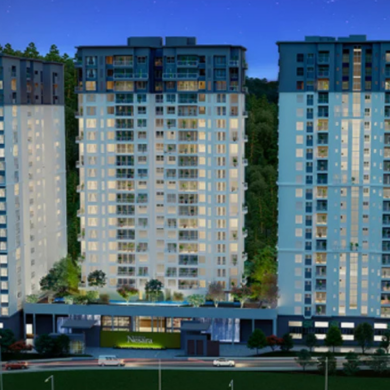
GST on under-construction property impacts costs, exemptions, and compliance. Understanding how GST is calculated on under-construction property, GST rates, Input Tax Credit, and key conditions can ensure informed decisions and can maximise your real estate investment value.
Navigating the financial intricacies of buying an under-construction property often brings GST into the focus. Understanding GST on under-construction property gives clarity on its financial implications and helps take informed investment decisions.
By delving into its nuances, you can uncover potential savings and explore practical insights on how to avoid GST on under-construction property where applicable. This blog breaks down everything you need to know about GST on under-construction property.
Table of Contents
Why GST is Relevant for Under-construction Property Buyers
GST (Goods and Services Tax) is particularly relevant for buyers of under-construction properties in India, due to its significant financial implications – making it essential to explore how to avoid GST on under-construction property wherever possible.
Standard Rate: For non-affordable residential properties, GST on under-construction property is levied at 5% of the property value. For affordable housing, the rate is reduced to 1%. Importantly, these rates do not include the Input Tax Credit (ITC) benefits, which means buyers cannot claim credits for the GST paid on construction materials.
Exemption for Completed Properties: GST is not applicable on ready-to-move-in properties that have received a completion certificate. This distinction makes under-construction properties subject to GST, whereas completed ones are exempt.
Financial Implications
- Cost Structure: The introduction of GST has simplified the tax structure by replacing multiple indirect taxes.
- Judicial Rulings: Recent court rulings have clarified that the value of land (which is exempt from GST) should be deducted from the total sale price, before calculating the GST on construction services – as stated in an Economic Times article. This can lead to significant savings for buyers, where land constitutes a substantial portion of the property value.
- Investment Security: While under-construction properties carry risks related to project completion timelines, they often come with lower upfront costs. This is due to the application of GST compared to completed properties that are priced higher because they are ready to move into.
Importance of Understanding GST Implications in Real Estate Transactions
Understanding the implications of GST in real estate transactions is crucial for both buyers and developers. Here are the key reasons:
- Tax Structure Clarity: GST replaced multiple indirect taxes with a unified framework, simplifying tax liabilities for buyers
- Financial Impact on Buyers: GST increased costs for under-construction properties as buyers cannot claim ITC
- Compliance and Legal Considerations: Buyers must ensure GST compliance to avoid legal complications
What is GST on Under-construction Properties?
Under-construction properties refer to residential or commercial real estate that is currently being built and has not yet been completed. While purchasing an under-construction property in India, the Goods and Services Tax is applicable. The GST rates for such properties are as follows:
-
Affordable Housing Projects
GST is charged at 1% without input tax credit (ITC). Affordable housing includes homes valued at up to ₹45 lakh, and with a carpet area not exceeding 60 sq. m in metro cities or 90 sq. m in non-metro cities.
-
Non-affordable Housing Projects
GST is charged at 5% without ITC for under-construction properties, that do not fall under the affordable housing category.
-
Regular Residential Properties
For non-affordable housing, or any other residential properties whose price is more than ₹45 lakh, the applicable GST rate is 5%.
-
Commercial Properties
The GST rate for commercial properties is generally higher, set at 12%, but this may vary depending on specific project details and location.
-
Clarification on Taxable Value
GST is not levied on the total property value. Instead, only two-thirds of the property value is considered taxable, as one-third of the value is deemed as land cost and is exempt from GST.
For example, if the total value of an apartment is ₹60 lakh, only ₹40 lakh (two-thirds of the value) is taxable under GST. The applicable rate (5%) will be applied to ₹40 lakh.
Key Points to Remember
- Ready-to-Move-in Properties: How to avoid GST on under-construction property is a common question among buyers. One effective option is to choose ready-to-move-in properties instead. This can eliminate the GST component and reduce your overall property cost.
- Stamp Duty and Registration: GST is separate from stamp duty and registration charges, which are still payable.
How to Calculate GST on Under-construction Property with Examples
Knowing how GST is calculated on under-construction property will ensure clarity in determining the total cost and help you understand how to avoid GST on under-construction property effectively.
Formula to Calculate GST on Under-construction Property
This calculation involves deducting the land value (1/3 of the total property value) and applying the applicable GST rate to the remaining value. The formula is:
GST Amount = (Total Property Value × 2/3) × GST Rate / 100
Components of the Formula
- Total Property Value: The overall price of the property
- Two-thirds Taxable Value: Only two-thirds of the property value is taxed, as one-third is considered the land cost and is GST-exempt
- GST Rate:
- 1% for affordable housing
- 5% for non-affordable housing
Examples
How GST is calculated on under-construction property – Affordable Housing
- Total Property Value: ₹42,00,000
- GST Rate: 1%
Step-by-Step Calculation:
- Taxable Value: ₹ 42,00,000 × 2/3 = ₹28,00,000
- GST Amount: ₹28,00,000 × 1/100 = ₹28,000
- Total Payable Amount: ₹42,00,000 + ₹28,000 = ₹42,28,000
How GST is Calculated on Under-construction Property – Non-affordable Housing
- Total Property Value: ₹75,00,000
- GST Rate: 5%
Step-by-Step Calculation:
- Taxable Value: ₹75,00,000 × 2/3 = ₹50,00,000
- GST Amount: ₹50,00,000 × 5/100 = ₹ 2,50,000
- Total Payable Amount: ₹75,00,000 + ₹2,50,000 = ₹77,50,000
This formula specifies how GST is calculated on under-construction property, factoring in the exemption of land value for all under-construction properties.
| Aspect | Under-construction Properties | Completed Properties |
| GST Applicability | Subject to GST | Exempt from GST |
| Tax Calculation | Calculated on the sale price during construction | No GST charges incurred |
| Legal Classification | Considered a service until completion | Classified as finished goods |
Impact of GST on Homebuyers
The impact of GST on homebuyers in India presents both advantages and disadvantages. Here is a breakdown of the pros and cons:
| Pros | Cons |
| Price Transparency: GST has simplified the tax structure, providing clearer insight into the taxes applicable on property purchases, as multiple indirect taxes have been consolidated under GST | Increased Costs for Under-construction Properties: 5% GST on non-affordable housing can raise the overall cost of purchasing an under-construction property |
| Affordable Housing Benefits: The reduced GST rate of 1% for affordable housing makes these properties more accessible to middle-income groups and first-time buyers | No Input Tax Credit (ITC): Buyers cannot claim ITC on the GST paid for under-construction properties, so they bear the full tax burden without offsets against other tax liabilities |
| Encouragement for Developers: Rationalisation of GST rates has incentivised developers to focus on affordable housing, increasing supply in this segment | Potential Price Hikes by Developers: The inability to claim ITC may lead developers to pass on increased costs to buyers, resulting in higher property prices overall |
Input Tax Credit (ITC) for Buyers and Developers
ITC allows businesses to claim credit for the GST paid on inputs used during their operations. In real estate, developers can claim ITC on the GST paid for construction materials, services, and other inputs used in constructing residential or commercial properties. This credit is then offset against their output GST liability when they sell the property.
Understanding ITC can help you know more about how to avoid GST on under-construction property. By opting for ready-to-move-in properties or properties where developers effectively manage ITC benefits to lower their GST liability, buyers can minimise their tax burden.
For Developers: Maximising Financial Efficiency
- Cost Reduction: By claiming ITC, developers can significantly reduce their overall tax burden. The ability to offset GST paid on inputs against the GST collected on sales, means that they can maintain healthier profit margins.
- Competitive Pricing: With reduced costs from ITC, developers may be able to offer more competitive pricing on their properties. This can attract more buyers, particularly in a market where affordability is a concern.
- Cash Flow Management: ITC helps improve cash flow for developers, by allowing them to reclaim tax paid on inputs sooner rather than later. This liquidity can be reinvested into ongoing projects or used to fund new developments.
For Buyers: Understanding the Implications
While buyers of under-construction properties cannot directly claim ITC, understanding its implications can still yield benefits:
- Lower Property Prices: When developers benefit from ITC, they may pass on some of these savings to buyers in the form of lower prices or better amenities. This can make purchasing an under-construction property more attractive.
- Transparency in Pricing: Knowing that developers are claiming ITC can provide buyers with more transparency regarding pricing structures. It reassures them that they are not overpaying due to excessive tax burdens imposed on developers.
- Investment Value: Properties sold by developers who efficiently utilise ITC may have a higher perceived value, due to competitive pricing and enhanced quality stemming from better resource allocation.Read More: GST Rate on Real Estate, Flat Purchase, Plot Sales – An Ultimate Guide
Factors that Affect the GST Amount
Understanding the implications of GST on under-construction property is essential for both homebuyers and developers. The GST framework significantly influences the overall cost of purchasing a property, and many factors can affect the GST amount that buyers need to pay.
- Type of Property: GST rate differs based on property classification, with affordable housing attracting a lower rate of 1% and non-affordable housing at 5%
- Input Tax Credit: While ITC is unavailable for affordable housing, it can be claimed on non-affordable properties, potentially reducing the effective GST burden
- Additional Charges: GST is applied only to the construction service component, excluding other costs like land price, stamp duty, and registration charges
- Government Schemes: Certain government initiatives may offer GST concessions for eligible projects, providing additional savings for homebuyers
Key Exemptions and Conditions for GST on Under-construction Properties
Exploring the exemptions and conditions under the GST framework is important for homebuyers, to understand how GST is calculated on under-construction property. It also helps in gauging how to avoid GST on under-construction property where applicable.
- Exemption for Completed Properties: Once a property receives its completion certificate, it becomes exempt from GST, meaning buyers of ready-to-move-in homes do not incur any GST charges – leading to potential savings
- Input Tax Credit Limitations: While ITC is not available for properties under the affordable housing category, it can be claimed on non-affordable housing – allowing developers to potentially pass on some cost benefits to buyers
- Land Value Deduction: While calculating GST on under-construction property, one-third of the price is deducted as land cost, effectively lowering the taxable value and thus the GST amount payable
Impact of GST on Property Prices
The introduction of GST on under-construction property has influenced property prices in India. Understanding this impact can help customers plan their real estate investments more effectively.
- Variations by Property Type: GST rates differ, with affordable housing attracting a reduced rate of 1% and non-affordable housing subject to 5%
- Impact on Affordable Housing: Additional taxes like GST on FSI could make affordable housing projects economically unviable, pushing prices up by 7-10%
Documents Required for GST Filing and Documentation on Under-construction Properties
While dealing with GST on under-construction property, proper documentation is essential for compliance and to ensure a smooth filing process. Here is a concise overview of the key documents required for GST filing:
- Sale Agreement: A copy of the sale agreement between the buyer and the developer is crucial, as it outlines the terms of the transaction and serves as proof of the sale
- GST Registration Certificate: Buyers and sellers should have valid GST registration certificates, which are necessary for filing returns and claiming any eligible Input Tax Credit
- Invoice from Developer: The invoice issued by the developer detailing the property price, applicable GST rate, and total amount payable is essential for accurate GST filing
- Payment Receipts: Receipts of all payments made towards the property, including booking amounts and instalment payments, should be maintained, as they support ITC claims
- PAN Card: Permanent Account Numbers of both buyer and seller are required for identification purposes, during GST filing
- Bank Statements: Transactions related to the property purchase can help substantiate claims made in GST filings
Challenges and Common Queries Regarding GST on Under-construction Property
Navigating GST on under-construction property can be complex, leading to various challenges and common queries among consumers.
- Complexity of GST Regulations: This is one of the primary challenges, which can vary based on property type and location
- Input Tax Credit Confusion: Many buyers are often confused about the eligibility and process for claiming ITC on under-construction properties, especially regarding what expenses qualify
- Impact of GST on Pricing: Consumers frequently query how GST on under-construction property affects the overall price, particularly in relation to affordable housing and market fluctuations
Conclusion
Understanding the nuances of GST on under-construction property is essential for taking informed real estate decisions. By exploring how GST is calculated on under-construction property, applicable exemptions, and affordable housing benefits, buyers can strategically plan their investments.
It is also important for some investors to understand how to avoid GST on under-construction property. Proper documentation and awareness of conditions like ITC ensure compliance, while optimising financial outcomes.
FAQs
1. What is the current GST rate on under-construction properties?
The current GST rate on under-construction property is 1% for affordable housing and 5% for non-affordable housing without Input Tax Credit.
2. Is GST payable on under-construction property?
Yes, GST is payable on under-construction property, but not on completed properties with completion certificates.
3. How is the GST rate different for affordable and non-affordable housing?
The GST rate is different for affordable and non-affordable housing, with affordable housing attracting 1% GST and non-affordable housing taxed at 5%, both without ITC benefits.
4. Can a developer charge 12% GST?
No, a developer cannot charge 12% GST under the current regime, as GST on residential properties is capped at 5% for non-affordable housing and 1% for affordable housing.
5. Do we need to pay tax for under-construction property?
Yes, we need to pay tax for under-construction properties, which is 5% for regular housing and 1% for affordable housing – both without ITC benefit.
6. Who pays GST, the developer or the buyer?
Buyers pay GST, which is collected by the developer and remitted to the government.
7. What is the GST rate for construction houses?
The GST rate for construction houses is 1% for affordable housing and 5% for other housing categories.
8. Can I claim Input Tax Credit (ITC) as a property buyer?
No, you cannot claim Input Tax Credit as a property buyer under the current GST regime.
9. Are there any exemptions on GST for under-construction properties?
No, there are no exemptions on GST for under-construction properties; only completed properties with completion certificates are exempt.
10. How can I verify the GST amount paid to the developer?
You can verify the GST amount paid to the developer, by reviewing the invoice issued by the developer and cross-checking it with the applicable GST rates.









